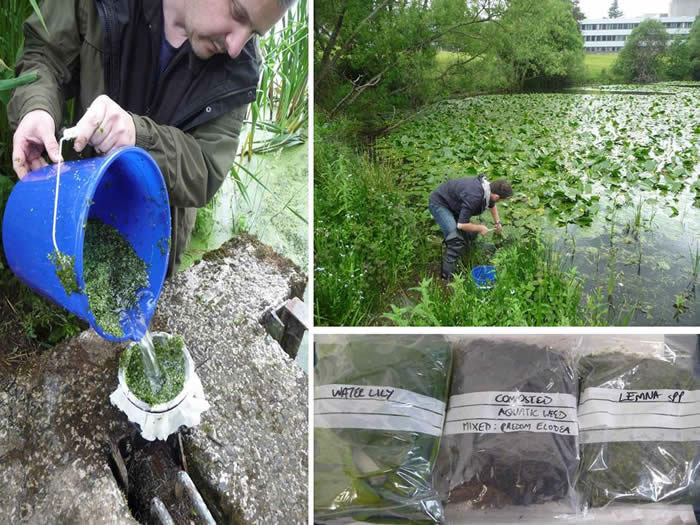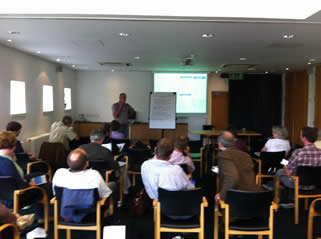News & Updates
Rescobie Loch site visit: May 2013
Members from Stiring University visited Rescobie Loch on May 9th 2013 to visit Sandy Forgan (Rescobie Loch Development Association) and Andy Vinten (JHI) and to discuss aquatic weed harvesting. Preliminary nutrient and microbial analysis is being undertaken on some composted weed material and a network of riparian farmers provide an opportunity for debating the pros and cons of land application of composted aquatic plants. The practicality of aquatic weed harvesting in terms of material collection and transfer poses a key challenge ahead of composting.
Press Release -Could pond waste be the 'new' fertiliser? : May 2013
The University of Stirling is to lead a new scoping project to develop a strategy for using nutrient-rich aquatic biomass waste – from ponds, wetlands and other water-bodies – in farming, as an environmentally sustainable alternative to synthetic fertiliser. Click here for press release.
Professor Paul Withers jons the ReBALAN:CE team: June 2013
Professor Paul Withers has joined the ReBALAN:CE project and will provide additional expertise linked to phosphorus cycling in agricultural catchments.
Lunan Science Update Meeting: June 25th 2013, Finavon Hotel, Forfar
Melanie van Niekerk attended the Lunan Science Update Meeting on June 25th 2013. The workshop explored how to link science and management for delivery of ecosystem services. The ReBALAN:CE project provided food for thought via a poster display and generated interest not only among the scientists attending but across the farming community too.
Desk-based scoping study considers initial cost:effectiveness assessment of aquatic macrophyte harvesting: June 25th 2013
Andy Vinten and Mel van Niekerk have drafted an important resource to fuel discussion and debate across the ReBALAN:CE team. The desk-based study 'Cost-effectiveness assessment for mitigation of P loadings and eutrophication in Rescobie Loch: a comparison of aquatic macrophyte harvesting with other potential methods' provides a case-study example to interrogate further and also helps in the generation on new hypotheses to test as part of our larger project proposal.
Aquatic plant material collected for pilot data on nutrient recovery: July 2nd 2013
Aquatic plant material has been collected from a eutrophic loch in order to obtain some additional preliminary data on nutrient recovery from a varietry of different plant species. The samples will receive an application of microbes and enzymes to break down cell walls etc. and release N and P, which we will then recover and quantify.

Attendance list for Horizon Scanning Workshop is taking shape: August 2013
The ReBALAN:CE team have attracted the attendance of a range of UK experts and representatives from stakeholder organisations for the project workshop on August 29th and 30th. In addition we have secured the attendance of overseas colleagues to provide an international perspective on resource recovery from aquatic plant and algal biomass in impacted water bodies.
ReBALAN:CE Horizon Scanning Workshop - thank-you to all participants!: September 2013
The ReBALAN:CE project hosted a project workshop on the 29th and 30th August at the University of Stirling with invited experts and a range of representatives from stakeholder organisations in attendance. If you are interested in obtaining a copy of the workshop report then please contact David Oliver.

Dr Peter Hunter joins the ReBALANCE team: October 2013
Dr Peter Hunter (University of Stirling) has joined the ReBALAN:CE project and will provide additional expertise linked to cyanobacterial toxin analysis. This is essential for understanding potential risks to human health of APB harvesting and re-application to land.
Field sites for proposed Phase II of ReBALANCE now confirmed: October 2013
Phase II of the ReBALANCE project (if funded) will focus on the monitoring of two UK sites (providing contrasting climatic and water quality characteristics, and different stakeholder interests) to quantify longer-term consequences of aquatic plant biomass (APB) harvesting. APB cutting is undertaken at both sites using mechanical aquatic plant harvesters as part of routine management and thus, well supported in terms of social infrastructure and availability of supplementary data. The sites selected are: (i) Rescobie (and Balgavies) Loch, Scotland; and (ii) Whitlingham (Greater & Little) Broad, Norfolk Broads, England. This long term monitoring will be complemented with field-scale trials using Airthrey Loch and Howietoun Freshwater Research Unit, both eutrophic waterbodies owned by the University of Stirling. In addition the ReBALANCE team have secured access to the test field facilities (replicated pond and large mesocosm systems) at the Datong experimental site in China.
Critical Review manuscript submitted for peer review: November 2013
Our criticial review article 'Resource recovery from eutrophic waters: closing the nutrient loop' was submitted for peer review in October.
Dr Andy Vinten visits Pittarthie Farm in Fife: November 2013
Pittarthie Farm in Fife is used as a demonstration and teaching site by The Soil Association, Forestry Commission, SRUC, SEPA, SNH and others. Dr Vinten visted the site to explore the use of the farm as part of the ReBALANCE fieldwork to complement larger scale studies at Rescobie Loch and the Norfolk Broads, and smaller scale investigations at Airthrey Loch and Howietoun Freshwater Research Unit. The site is now included within our proposed research programme.
ReBALANCE Phase II - our proposal for a larger research project is submitted to NERC : November 2013
Our longer-term research vision was informed by our 6-month catalyst grant that explored the breadth of global challenges of nutrient recovery from Aquatic Plant and Algal Biomass. Through our critical review and stakeholder workshops we have identified and prioritised 6 exciting work-packages. Using a whole-systems approach, we propose to combine detailed measurement and experimentation across a range of scales (mesocosm to catchment) with novel socio-economic analysis and modelling to characterise, quantify & evaluate opportunities and risks associated with Aquatic Plant Biomass recycling and reuse for the delivery of multiple ecosystem services and benefits.
